![[New] Speak Now, Act for Free via Technology for 2024](https://thmb.techidaily.com/db339cfb71ad17e704275f446976657b74bdf593b2c3464a856c74dd3bbe549b.jpg)
[New] Speak Now, Act for Free via Technology for 2024

Speak Now, Act for Free via Technology
It’s an obvious fact that speech recognition has been available for decades. But it was only until the emergence of AI (Artificial Intelligence) and ML (Machine Learning) technologies that this invention burst into life. Today, most smartphones and computers come baked with automatic speech recognition services. So, what exactly is voice recognition, and how can you exploit it on your smartphone or desktop? This article answers these questions. You’ll also learn how to use the best free voice recognition programs. Let’s dig in!
Part 1: What is Speech Recognition?
Computers and smartphones are catching up with human intelligence. Today, you can command your computer, smartphone, or smart speaker. Google Assistant, Microsoft’s Cortana, and Amazon Alexa are good examples of how far speech recognition has come. Just give a command, and the voice assistant will be at your service.
But this article will dive a little deeper than the obvious. Instead of dwelling on voice assistants, we’ll discuss how you can use an automated STT program to convert audio to text. The speech recognition technology has matured enough to allow users to enjoy 99% transcription accuracy. Also, these speech-to-text transcription programs support hundreds of languages, making them perfect for bloggers, teachers, doctors, and other professions.
But take note that the ability and complexity of these programs may vary. While some are beginner-friendly, others, like Amazon Web Services and Microsoft Azure, can be a little intimidating to beginners. Also, some TTS programs like Google Speech Recognition don’t need PC downloads, saving you time. So, it depends on your preferences and skills.
Part 2: Best Free Speech Recognition Services in 2022
We understand that professional speech-to-text services can cost a few hundreds of dollars. Therefore, we’ve dug deep to bring you these four free and highly accurate speech recognition services. Make a pick!
- Google speech recognition
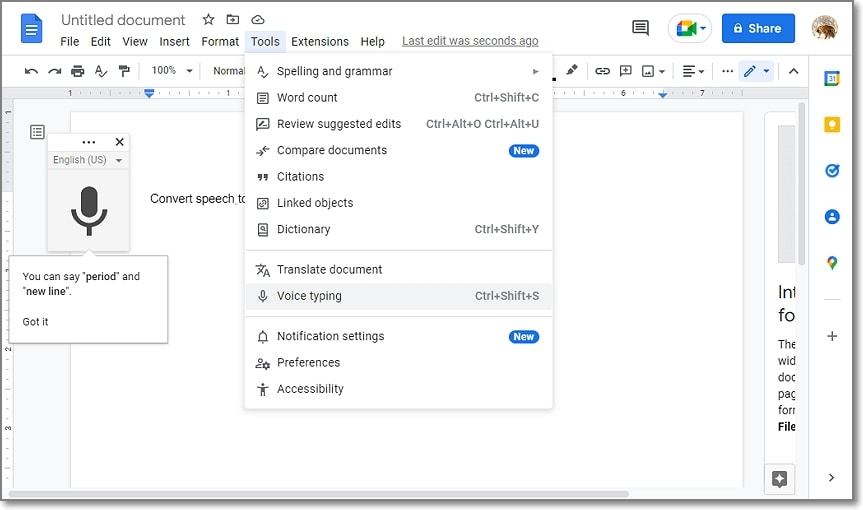
Founded in September 1998, Google has come a long way to be one of the biggest tech companies. The company features multiple transcription services, including Google Translate , which translates audio, documents, and texts between various languages. It supports 133 languages and is free to use on your mobile or PC browser. Just click the microphone icon on Google Translate and begin translating words.
Besides translation, use Google Cloud to transcribe video, audio, or voice to increase your audience reach. Users can add accurate captions and subtitles to their content in real-time, thanks to ML technology similar to what Google uses to generate YouTube subtitles. It’s tailored for the Global user base as it supports 125+ languages. Google Cloud also allows you to boost transcription accuracy by providing domain-specific words or keywords.
As for the pricing, Google Cloud gives you up to $300 credits to spend over three months with the free tier. After exhausting the free minutes, you can transcribe 15-second audio for just $0.006. Now that should be affordable for all average Joes out there.
If Google Cloud doesn’t impress you, transcribe audio for free with Google Docs . It’s an online service allowing you to dictate texts from the built-in microphone. To do that, start a new document, click “Tools,” and then tap “Voice typing.” Now dictate unlimited texts before editing them accordingly. Remember, Google Docs supports collaborative editing.
- Microsoft speech recognition
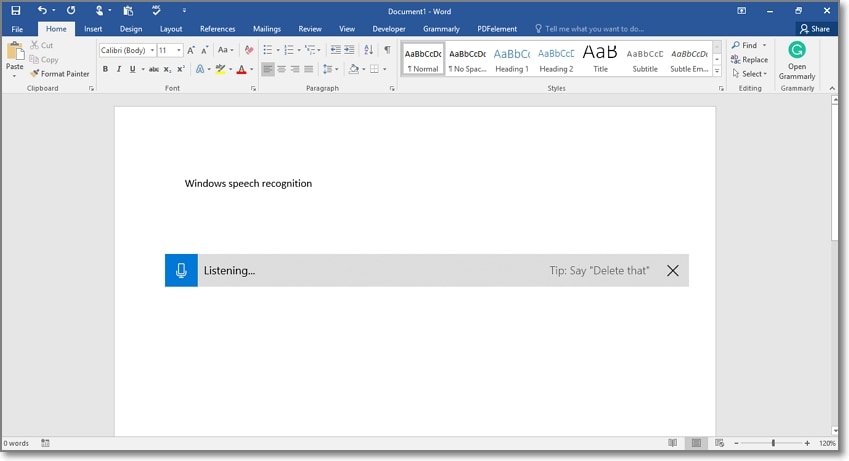
Like Google, Microsoft has a collection of speech recognition services too. First, you can use the built-in speech recognition service on your Windows 10/11 computer. It’s a free service that gives you essential assistant and command capabilities. Please note that this is different from Cortana’s voice assistant.
To use Windows speech-to-text service, start by opening the program into which you want to dictate texts. This can be your browser, text editor, and so on. Then, click the Win + H shortcut before clicking the microphone icon to start dictating texts.
Alternatively, use the super-accurate Microsoft Azure speech-to-text service. This professional feature lets you create texts from a host of audio sources. It provides real-time audio transcription, thanks to the deep ML and AI networks that work in sync to support multiple audio sources concurrently. However, setting it up is a different ballgame altogether.
If Azure Speech to Text is too complicated for you, use OneNote to dictate texts while signed into Microsoft 365. This voice recognition software can dictate texts with punctuations, emojis, periods, symbols, currencies, and more. Also, you can edit texts by merely uttering words like delete, undo, backspace, etc.
Wondershare Filmora 11 is a powerful video editor for macOS and Windows systems. It packs many powerful features, including the AI-driven speech-to-text and text-to-speech converters. Here, you can transcribe audio or video in various languages before editing and extracting the text to a .srt file. So yes, it’s a fast and accurate subtitle generator for desktops.
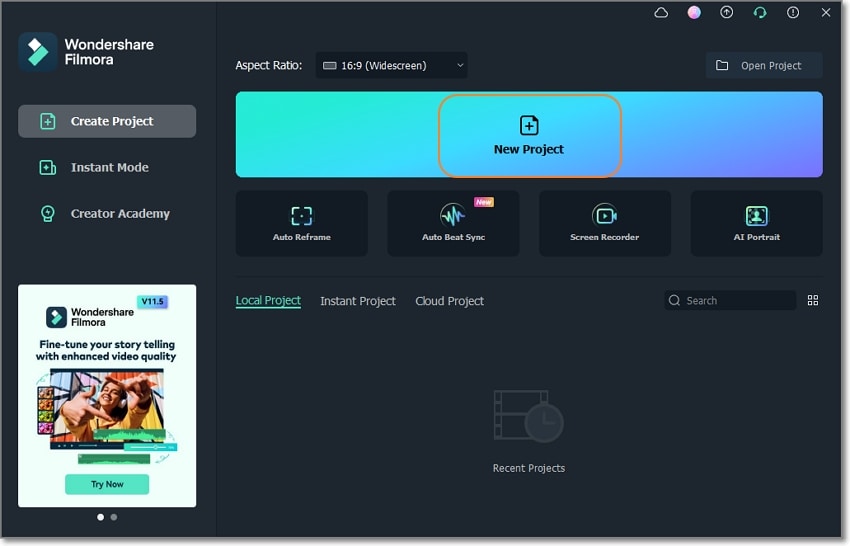
To generate subtitles with Filmora 11, run the program on your desktop and create a New Project. After that, click the Import button to browse and load a video or audio from your local storage. Of course, you can drag and drop the media file to save time. Either way, move the uploaded file to the storyboard.
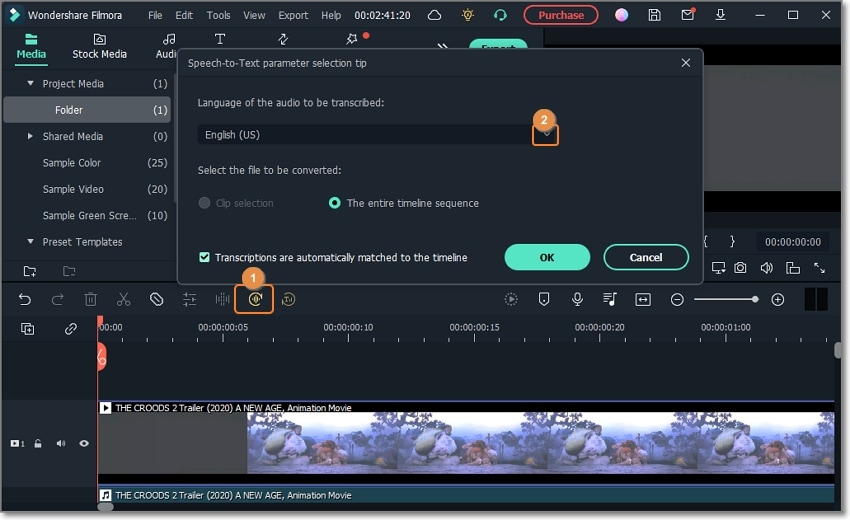
Next up, right-click the video and choose Detach Audio. In other words, you’ll be separating audio from the video clip. After that, select the audio track on the timeline and click the Speech-to-Text icon to choose the transcription language. You can transcribe the audio in English, French, German, Italian, and other languages.
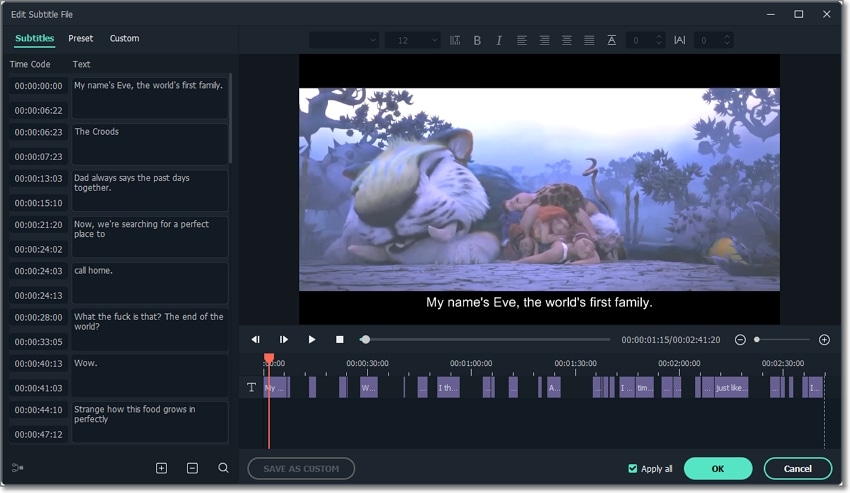
Now tap “Ok” to encode audio to subtitle texts. If the process is successful, double-tap the text track on the timeline to view and edit the subtitle tracks. You can change the text, layout, size, color, and more. Lastly, export the texts to an SRT file and use it on any video. It’s that quick and easy!
- Amazon Transcribe
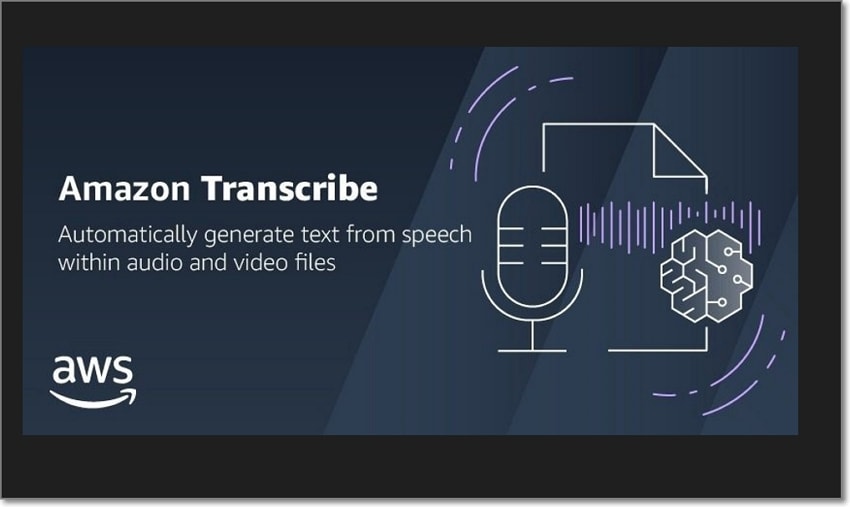
Have you ever heard of AWS? Well, it is a comprehensive cloud platform with more than 200 services. AWS uses Machine Learning and Artificial Intelligence, making it easier, faster, and more cost-friendly. Even better, AWS has up to 98 security standard certifications, making it one of the safest cloud platforms to create and edit content.
That said, use the Amazon Transcribe feature to convert audio and voices into editable texts automatically. This service lets you extract critical insights from voice calls, videos, conversations, microphone narrations; you name them. It also uses deep ML to add formatting and punctuations to your text during dictation.
AWS Transcribe also includes a few extras that you might find helpful. For example, it supports batch processing from numerous audio sources. Also, it can identify different speakers and vocabulary filtering, giving you the much-needed consistency. Plus, you can add specific vocabulary and keywords to enhance content accuracy.
Cost-wise, you’ll enjoy up to 60 minutes of free transcription services with an AWS free tier account. After depleting the credits, you can pay for the standard pay-as-you-go rates. All in all, it’s an excellent speech recognition service, although it can be an overkill for personal use.
Part 3: Speech Recognition FAQs
Do you have a lot of unanswered questions about voice recognition? Here are some answers to the most common speech recognition FAQs.
1. Is dictating texts faster than typing texts?
It depends! For people without quick typing skills, dictating audio is a no-brainer. TTS programs such as Windows Speech Recognition and Google Docs allow you to dictate texts directly into the document file before editing where necessary. However, it takes a lot of discipline and clarity to dictate texts accurately.
2. How can I improve the accuracy of speech recognition?
First of all, some speech recognition services are more accurate than others. But the overall text accuracy will depend on the clarity of your voice. While the built-in mic will do fine, investing in a noise-canceling voice input device is better. You should also dictate texts with longer phrases more often. And another thing, avoid using slang and abbreviations.
3. Is voice recognition technology accurate?
Yes, all the voice recognition services discussed above are very accurate. But as said before, this depends on a lot of factors. Also, it’s paramount to preview your transcription work and add the necessary corrections. Remember, human intelligence is always superior.
Final Words
Now you know how speech recognition can be helpful in your documentation work. If you want something free and highly effective, I recommend Google Docs or Windows Speech Recognition to dictate texts on your document app. On the other hand, use Filmora 11 to auto-generate subtitles from any audio or video file. But if you’re a techie, nothing stops you from using Microsoft Azure or Amazon Transcription. Give them a try!
Free Download For Win 7 or later(64-bit)
Free Download For macOS 10.14 or later
Free Download For macOS 10.14 or later
Also read:
- [New] 2024 Approved Comprehensive Insight Into the Ultra-Clear LG Monitor
- [New] Discovering Every Nook of Polarr's Editing Capabilities
- [New] In 2024, Sony Unveils Excellence The 4K Smartphone Breakthrough with Xperia XZ
- [New] In 2024, Unlocking iPhone X Ease Mending Face ID Problems
- [Updated] 2024 Approved TOP 8 Digital Collage Crafting Software
- [Updated] Ignite Your Screenplay Essential Wins11 Apps & Games for 2024
- [Updated] In 2024, Future's Echo Top 30 Metaverse Sentiments [AR/VR]
- [Updated] In 2024, Gelato Guru's Guide Step-by-Step to Sweet Screen Recording
- [Updated] Learn How to Change Your In-Game Character's Vocal Presence with Ease - For FREE for 2024
- [Updated] Starting Point for Motion Visual Effects
- [Updated] Upload Like a Pro The Ultimate Guide to Photo Videos and Online Success for 2024
- 7 Critical Thoughts on AI as Therapy Substitutes
- Bypassing Google Account With vnROM Bypass For Vivo V27 Pro
- In 2024, InstaGrabs Top 15 Video/Photo Downloading Tools
- Is It Time to Replace Your Older-Model iPad? - Expert Insights
- New In 2024, Harmonizing Your Library The Best Places to Stream and Save Background Music
- Pro Tips on Podcast Titling & A Collection of Over 50 Engaging Names
- The Artisan's Approach Expert Color Alteration Tactics
- Thinking About Changing Your Netflix Region Without a VPN On Honor Magic 5? | Dr.fone
- Title: [New] Speak Now, Act for Free via Technology for 2024
- Author: Larry
- Created at : 2025-01-02 16:08:07
- Updated at : 2025-01-06 16:05:40
- Link: https://fox-glue.techidaily.com/new-speak-now-act-for-free-via-technology-for-2024/
- License: This work is licensed under CC BY-NC-SA 4.0.